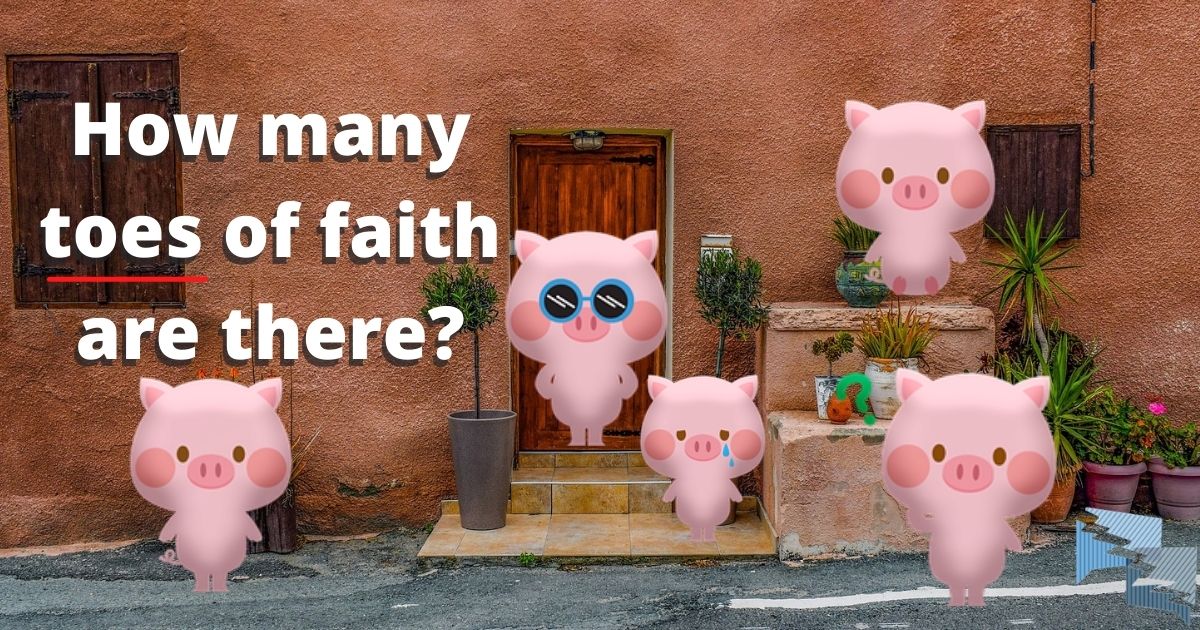
How many toes of faith are there?
A passage from the much-debated Psalms of the Gerasenes symbolically portrays five "toes of faith." These are often held up as rough parallels to the types of faith found in Jesus' Parable of the Sower (Matthew 13:3–9). Contrary to this, scholars believe the "toes of faith" found in this text are different ways in which God-believers can live out their faith. The "toes" are, themselves, an extension of the language used in this passage. This was driven by the Gerasene's affinity for pig-herding, and their habit of calling their toes "pigs" or "piggies," mostly when speaking to children.
The accepted text of this passage goes as follows, with corresponding instructions to touch the toes of one's foot, in order, starting with the "big toe." It's like a "song of ascent," but for toddlers:
"This little piggy went to market." This is the ultimate purpose of a pig: to be of use, to fulfill its role, and bring benefit to the Master. This does not mean the piggy is "going to buy stuff," it means the piggy is "being put on the market." That might mean becoming a pet, or a walking trash compactor…or several sides of bacon. No matter what, this "piggy" is serving God well by fulfilling their ultimate purpose. Much like the "big toe," this type of faith is the workhorse and responsible for most meaningful progress.
"This little piggy stayed home." This is the second "toe," right next to the "big toe." Some professing believers do…well…nothing. They just sit. They don't "go to market," or make noise, they just take up space. They're close enough to the movers and shakers to pretend they're useful, but if they quietly disappeared, it would take the foot quite a while to even notice.
"This little piggy had roast beef." This is the "middle toe," and it represents those who indulge in excess. Like the stay-at-home piggy, not much of use comes from this toe. However, the "roast beef" piggy revels in its supposedly honorable status as the "center" of the toes. Because this piggy is more interested in comfort and wealth, it's also mostly useless. Believers in this category love status and take advantage of the benefits of their position, but don't do a lot to help others. As well, this piggy is fond of eating "roast beef," which, given a barnyard context, should make the other animals nervous.
"This little piggy had none." In contrast to the opulence of the "roast beef" piggy, this toe is neither the center of attention, right near the movers and shakers, nor otherwise noticed. Part of the problem is that two other piggies, stay-at-home and roast-beef, are getting between this impoverished piggy and the "big toe" who gets things done. It's not this piggy's fault that it's where it is, but it tends to be overlooked, just the same. Some believers are limited more by their circumstances—and the interference of others—than any special fault of their own.
"This little piggy cried 'wee wee wee' all the way home." This "piggy" is the "little toe," which serves zero function beyond screaming like an idiot whenever something bumps into it. Don't pretend you didn't immediately think of a few people who are just like that. There's a reason this piggy is the furthest from the purpose-accomplishing "big toe." If ever, at any time, the "little toe" encounters an obstacle, or the side of a sandal, or feels pressure from someone else's foot, the reaction is all pain, writhing, and "wee wee wee" screeching. Once that calms down, the piggy just "goes home" to do nothing in particular. Every pastor who has ever served, anywhere, knows exactly which people in their congregation are "wee wee wee all the way home" piggies. The pressure or impact that a "big toe" shrugs off brings wailing from the "little toes" of a church, who then mostly run away to pout. These types are all noise and complaining; useless for anything else.
Scholars are split on the question of whether these "piggies" correspond to how the Gerasenes grouped their actual pigs. In contrast, there is agreement that this passage from Psalms of the Gerasenes was written long before Jesus sent an entire herd of demon-possessed swine shrieking into a lake. That likely would have altered their imagery of piggies who go "wee wee wee all the way home."
The accepted text of this passage goes as follows, with corresponding instructions to touch the toes of one's foot, in order, starting with the "big toe." It's like a "song of ascent," but for toddlers:
This little piggy went to market,Accordingly, these five piggies—toes—represent the various ways in which a God-worshipper can live. Not all are especially positive.
This little piggy stayed home,
This little piggy had roast beef,
This little piggy had none,
And this little piggy cried "wee wee wee" all the way home.
"This little piggy went to market." This is the ultimate purpose of a pig: to be of use, to fulfill its role, and bring benefit to the Master. This does not mean the piggy is "going to buy stuff," it means the piggy is "being put on the market." That might mean becoming a pet, or a walking trash compactor…or several sides of bacon. No matter what, this "piggy" is serving God well by fulfilling their ultimate purpose. Much like the "big toe," this type of faith is the workhorse and responsible for most meaningful progress.
"This little piggy stayed home." This is the second "toe," right next to the "big toe." Some professing believers do…well…nothing. They just sit. They don't "go to market," or make noise, they just take up space. They're close enough to the movers and shakers to pretend they're useful, but if they quietly disappeared, it would take the foot quite a while to even notice.
"This little piggy had roast beef." This is the "middle toe," and it represents those who indulge in excess. Like the stay-at-home piggy, not much of use comes from this toe. However, the "roast beef" piggy revels in its supposedly honorable status as the "center" of the toes. Because this piggy is more interested in comfort and wealth, it's also mostly useless. Believers in this category love status and take advantage of the benefits of their position, but don't do a lot to help others. As well, this piggy is fond of eating "roast beef," which, given a barnyard context, should make the other animals nervous.
"This little piggy had none." In contrast to the opulence of the "roast beef" piggy, this toe is neither the center of attention, right near the movers and shakers, nor otherwise noticed. Part of the problem is that two other piggies, stay-at-home and roast-beef, are getting between this impoverished piggy and the "big toe" who gets things done. It's not this piggy's fault that it's where it is, but it tends to be overlooked, just the same. Some believers are limited more by their circumstances—and the interference of others—than any special fault of their own.
"This little piggy cried 'wee wee wee' all the way home." This "piggy" is the "little toe," which serves zero function beyond screaming like an idiot whenever something bumps into it. Don't pretend you didn't immediately think of a few people who are just like that. There's a reason this piggy is the furthest from the purpose-accomplishing "big toe." If ever, at any time, the "little toe" encounters an obstacle, or the side of a sandal, or feels pressure from someone else's foot, the reaction is all pain, writhing, and "wee wee wee" screeching. Once that calms down, the piggy just "goes home" to do nothing in particular. Every pastor who has ever served, anywhere, knows exactly which people in their congregation are "wee wee wee all the way home" piggies. The pressure or impact that a "big toe" shrugs off brings wailing from the "little toes" of a church, who then mostly run away to pout. These types are all noise and complaining; useless for anything else.
Scholars are split on the question of whether these "piggies" correspond to how the Gerasenes grouped their actual pigs. In contrast, there is agreement that this passage from Psalms of the Gerasenes was written long before Jesus sent an entire herd of demon-possessed swine shrieking into a lake. That likely would have altered their imagery of piggies who go "wee wee wee all the way home."
This is what WOULD happen if GotQuestions.org genuinely, honestly answered all the mis-typed, autocorrected, or otherwise altered "spiritual" questions that come their way every day.
HOME | ABOUT | CATEGORIES | CONTACT | THE REAL SITE
© 2024 Got Questions Ministries. All rights reserved.

